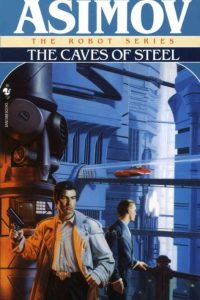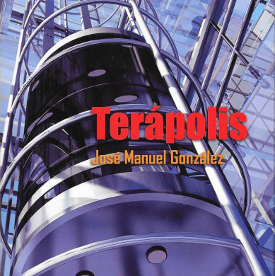 Alright we are back with my coverage on SF detectives and we return with the classic SF/mystery novel, written by the grand-daddy of SF himself, The Caves of Steel by Isaac Asimov.
Alright we are back with my coverage on SF detectives and we return with the classic SF/mystery novel, written by the grand-daddy of SF himself, The Caves of Steel by Isaac Asimov.
This first novel in the Robot series is one of the earliest novels to feature a combination of the SF and mystery genres. It features a future, roughly 3000 years from the present, with two rival human cultures: Earth and the Spacers. Earth is excessively over-populated (although there are only 8 billion humans, 1 billion less than we have now), but humanity is kept in check thanks to the “Cities”. These Cities, and yes the “C” is meant to be capitalized, are massive cyberpunky complexes of arcologies where every human need is provided by the central authority and every action is regulated. Although reminiscent of the city-planets such as Asimov’s Trantor or Zahn’s Coruscant, the Cities do not cover the entire Earth…yet. Despite the best efforts of the City governments, humanity continues to grow more numerous and it is only a matter of time before the Cities are unable to find the resources to meet their basic needs.
On the flip side you have the “Spacers”. The Spacers are the descendants of the original human colonists who settled around 50 planets. Unlike their Terran counterparts, they have low populations, long lives and robots. Robots are central to the Spacer economy and, after a short war with Earth, they have begun to implement them on Earth. Terrans are none too happy with this development since robots are starting to take jobs away from humans. Anger and resentment is building up and the Cities are not safe for either robots or Spacers (although they avoid trouble by never leaving “Spacetown”, a shielded and domed community on the outskirts of New York City).
The story begins with the protagonist, Elijah Bailey (an agrophobic detevice from New York) learning from police commissioner Julius Enderby about a Spacer named Roj Nemmenuh Sarton being found murdered in his home, his chest imploded by an energy blaster. Enderby charges Elijah with finding the murderer, but the Spacers have one condition: Elijah must work with a Spacer partner, a highly advanced robot named R. Daneel Olivaw. On the outside Daneel looks human. In fact his physical appearance is based on the victim, since he is designed to explore Terran culture and perhaps find away to convince Terrans the necessity of robots for their long-term survival. The Spacers believe “Medievalists”, a loose collection of robot hating humans who want to eject the Spacers from Earth and get humanity out of the Cities, murdered Sarton to prevent robots from become more prevalent. Bailey, however, believes it to all be a Spacer plot, but for the moment has no choice to work with Daneel. Together, they search for the murderer and try to avert an interstellar diplomatic incident.
The Caves of Steel is full of lies, misdirection, hidden agendas and gray morality. Essentially all the ingredients needed for a good mystery. As story progresses, Elijah learns to overcome his prejudices and work with Daneel, but in the end good old human ingenuity is needed to save the day. Unlike most novels, Asimov does not waste print on detailed description of the settings, letting the dialogue drive the story. I liked this because it gave me an opportunity to imagine the enclosed City of New York anyway I wanted (for some reason I pictured all of the wall being beige…hmm…need to update my imagination circuit). From a historical perspective, it is interesting to read about Terran hatred for robots and how it compares to racism of the 1950s, the decade of the novel’s publication. Considering the political atmosphere at the time, it is amazing you don’t hear more about this book being banned in certain school district. You gotta love SF. Add a robot or an alien and no one will notice your social commentary…at least consciously.
The novel is not without flaws. I groaned at the slang used by Elijah’s son which has more of place in the 1950s rather than three millenniums from now. Asimov presented such a vastly different human culture, but some characters sounded as if they belonged on the set of Happy Days. Furthermore, anyone looking for a strong female character is going to be disappointed. There are also plenty of “as you know” moments where characters had to constantly remind themselves about the Three Laws of Robotics.
I realize I might be inciting Internet rage by saying these things, but just because something is “classic” doesn’t always mean it will translate well into a modern audience (i.e. John Carter). A couple of Asimov’s predictions about the future have failed to come true such as Earth’s inability to support 8 billion humans and the plausibility of state-run economies being adopted across the world. Even the Cities are a little unbelievable. Would every single human culture and nation agree to wall themselves up in self-contained urban megalopolises? Wouldn’t some nations just refuse either because of cost, culture or some other reason? Of course I may be tad hard on Asimov. He certainly made a good point about how isolated, interstellar colonies might lose their resistance to human disease.
Despite missing out on many scientific advancement and political outcomes of the 20th century, The Caves of Steel is still a good read and an excellent example on how SF can transcend its boundaries and merge with other genres. Although certain aspects of the novel might not translate well into our society, if you can put yourself in the mind of an average geek of the 1950s, you get a glimpse of how people at the start of the Cold War thought about the future. In the meantime we can all look forward to the film currently in development and my next (and last) review concerning SF detectives: Do Androids Dream of Electric Sheep? by Philip K. Dick.










Nice reminder about a classic novel I haven't read in a long while.
Thanks! So far I have been enjoying the experience. I try to read highly recommended books that I have never read before and I have yet to be disappointed.
FWIW, I read several months ago that "Caves Of Steel" had been optioned as a motion picture. This still feels like a no-brainer to me–weird cop partners is practically a genre in its own right. But it's going to be tricky to make New York City not look too much like "Blade Runner." What I want to see is a movie based on "Naked Sun.,"
Forget about Blade Runner, I wonder if the agrophobic Earth society could be translated onto the screen at all or whether the producers will just write it out of the script.